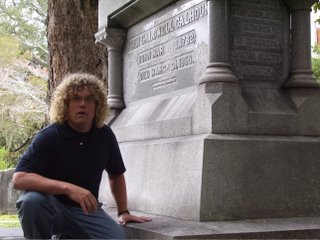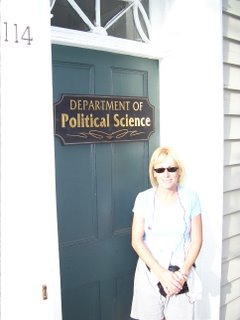A number of people have asked about my public education views. Regarding the whole governor thing, I mean.
Well...okay. I am for, with reservations, at least in the foreseeable future.
It has become customary to bash public education, and the state of our educational system in general. I really do want to sound a positive note; there are a lot of good things happening in North Carolina education, and I would want to continue that advance, to guide continued improvement. And the path to continued improvement is to foster choice. School choice would be the central premise of the education policy of a Munger administration.
We already know that it works. Both of my sons go to public schools. Now, my wife and I could easily afford elite private schools for my sons, but the excellence of the public school choices in Raleigh make it unnecessary. My sons went to Magellan Charter School in north Raleigh, and now attend Raleigh Charter High School downtown.
Newsweek magazine, in its May 16, 2006 issue, ranked the top 1,000 high schools in the United States. NC has 4 of the top 50, 9 of the top 100, and 17 of the top 200. Let me say that again: NC has 4 times as many top high schools as you would expect if all state public education systems were equally good.
Why is NC doing so well? Choice. NC has an educational system that welcomes innovation and individual initiative. The high school my sons attend, Raleigh Charter, is ranked 9th in the U.S., among all public high schools. That’s in the entire U.S., mind you: number 9 overall, among all U.S. public high schools. A group of private individuals put together a plan, formed an organization, and use public funds to run a public high school under a charter. And even though Raleigh Charter is one of the top ten high schools in the nation, its cost per student is less than half that of the average for NC high schools. Facilities costs are less, administrative costs are less, and janitorial services are either provided by the students (they take out their own trash), or by contracting out to private firms that clean the bathrooms and mop the floors. In spite of only spending 50 cents on the dollar compared to traditional state-run schools, students are still better off because they had a choice.
Now, it is true that not all charter schools are so successful, though it is also true that even the worst charter schools are no worse than the lowest-performing public schools. But think about it: what happens to a charter school that parents aren’t satisfied with? It closes, because its enrollments fall below the level required to secure sufficient funding to continue. What happens to a traditional public school that parents aren’t satisfied with? Nothing, because public schools are not just the last resort, they are the only resort for parents who are denied a choice.
Now, you can say that everybody has a choice. After all, there are private schools. And there is home-schooling. Both of these options have been selected more and more often in the past decade. Those choices are not enough, however. Private schools are not plentiful, and they are very expensive. Home-schooling is expensive too, in its own way, and not everyone is able to teach bright students the challenging material they need to know to succeed in the 21st century workplace.
I would argue that NC faces three fundamental problems in educating its children:
1. Huge disparities in the ability of counties to provide a solid basic education;
2. Low teacher pay, making it hard to attract good new teachers and even harder to keep the many excellent teachers already in the system;
3. a flight of the best students, particularly those from wealthy families, from the public schools into private schools or home-schooling arrangements. This takes a lot of the best students out of public schools, and sharply reduces support for school spending.
One possible solution, one I myself was opposed to, is the highly touted new "Education Lottery." But the lottery is a sham, a tax on poor people pursuing a dream that they will almost certainly never realize, given the odds. And it is most likely that lottery proceeds will displace existing education spending, as has been the case in other states.
Most people in government, particularly those in the state-sponsored parties, got there by making some variant of the same promise: “Vote for me, and I will give you other peoples’ money.”
My promise is a little different, when it comes to education: “Vote for me, and I will let you decide how to spend your
own money.” I would offer each parent in the state of N.C. an education voucher, financed by lottery proceeds, of $1, 250 per child in their household. This voucher could only be spent at a state-accredited school, or be credited to the household in the case of home-schooling. But I would make the accreditation process streamlined and simple, fostering the growth of charter schools, religious or theme schools, or any other kind of innovative educational program that can attract the children of parents who want to exercise their choices as parents.
Importantly, I would put a floor on public school spending at its existing level. Our schools need a lot of work, a lot of physical plant improvements, and better textbooks. A voucher/choice program cannot work by starving the traditional public schools of revenue. And I don’t want the General Assembly to be tempted to cut education dollars and use them for pork barrel spending in their districts, hoping lottery money will make up the difference.
What would be the effect of this voucher/choice program? In many counties, particularly in the beginning, this would simply mean that children would continue to attend the existing public schools, since there is no effective "choice" there. But at worst this would mean that there would be large infusion of funds into those school districts, representing a more effective settlement to the issues in the Leandro court case than anyone else has proposed. And over time, private schools, charter schools, and public schools that deliver good educations at low cost would find their enrollments increasing. Ultimately, “accreditation” would simply mean that voluntary choice of private parents resulted in enough enrollments to stay open. Schools that satisfied parents would be accredited by something like a market process: people value the service being provided enough to spend their voucher money there.
Because parents would be empowered to make a choice, many parents would investigate those choices and make the one that best suits them and their child. Because enrollments are a means of increasing school funding, students and their needs would start to count again. The public schools bureaucracy of our state seems to think it is doing us a favor by educating our children, because each child is an additional burden. Under my program, each student is a way of attracting more revenue.
NC is already doing pretty well, compared to public high schools across the nation. We have 4 times as many top-performing schools as would be predicted by an equal per-state distribution. But we can do better. And with the Munger voucher/choice program, we will do better.



